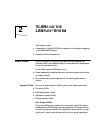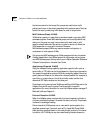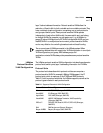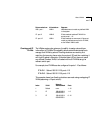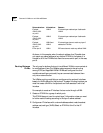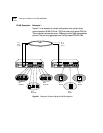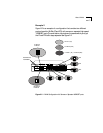
About VLANs 2-5
Default VLAN When you start up the LANplex system, the system automatically creates a
VLAN interface called the default VLAN. Initially, the default VLAN includes
all of the switch ports in the system. In the LANplex system, the default
VLAN serves to define:
■ The flood domain for protocols not supported by any VLAN in the system
■ The flood domain for protocols supported by a VLAN in the system but
received on nonmember ports
Both cases represent exception flooding conditions that are described in
the following sections.
Modifying the Default VLAN
New switch ports can dynamically appear in the LANplex system if you
insert a daughter LAN card or create an ATM LEC. When a new switch port
that is not part of a default VLAN appears in the system at initialization, the
system software adds that switch port to the first default VLAN defined in
the system.
LANplex VLANs also allow you to modify the initial default VLAN to form two
or more subsets of switch ports. If you remove the default VLAN and no other
VLANs are defined for the system, no flooding of traffic can occur.
How the LANplex®
System Makes
Flooding Decisions
Protocol-sensitive VLANs directly affect how the LANplex system performs
flooding. Without protocol-sensitive VLANs, the flooding process is to
forward data to all switch ports in the system. With protocol-sensitive
VLANs, the flooding process follows this model:
■ As a frame is received that needs to be flooded, it is decoded to determine
its protocol type.
■ If a VLAN exists for that protocol in the LANplex system and the frame’s
source port is a member of the VLAN, the frame is flooded according to the
group of ports assigned to that VLAN.
■ If a VLAN exists for that protocol in the LANplex system but the frame’s
source port is not a member of the VLAN definition, then the frame is
flooded according to the default VLAN assigned to that port.
■ If the protocol type of the received frame has no VLAN defined for it in the
system, the frame is flooded to the Default VLAN for the receive port.







